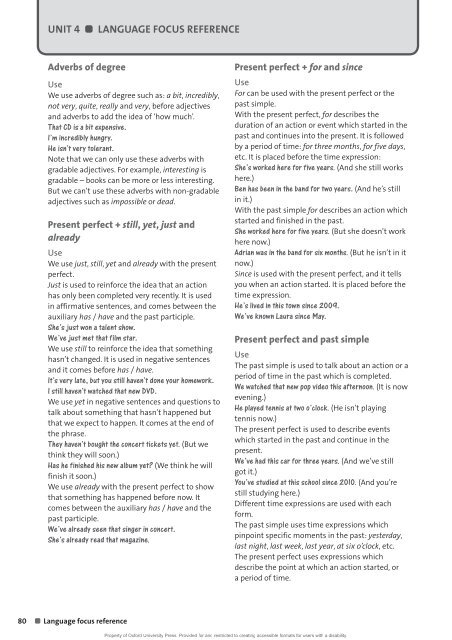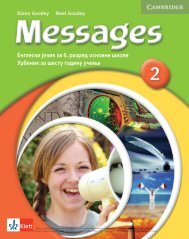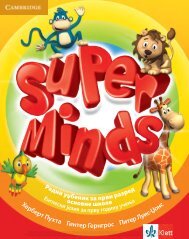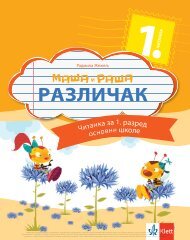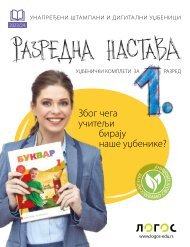Енглески језик 7, радна свеска, старо издање, Нови Логос
- No tags were found...
You also want an ePaper? Increase the reach of your titles
YUMPU automatically turns print PDFs into web optimized ePapers that Google loves.
UNIT 4<br />
LANGUAGE FOCUS REFERENCE<br />
Adverbs of degree<br />
Use<br />
We use adverbs of degree such as: a bit, incredibly,<br />
not very, quite, really and very, before adjectives<br />
and adverbs to add the idea of ‘how much’.<br />
That CD is a bit expensive.<br />
I’m incredibly hungry.<br />
He isn’t very tolerant.<br />
Note that we can only use these adverbs with<br />
gradable adjectives. For example, interesting is<br />
gradable – books can be more or less interesting.<br />
But we can’t use these adverbs with non-gradable<br />
adjectives such as impossible or dead.<br />
Present perfect + still, yet, just and<br />
already<br />
Use<br />
We use just, still, yet and already with the present<br />
perfect.<br />
Just is used to reinforce the idea that an action<br />
has only been completed very recently. It is used<br />
in affirmative sentences, and comes between the<br />
auxiliary has / have and the past participle.<br />
She’s just won a talent show.<br />
We’ve just met that film star.<br />
We use still to reinforce the idea that something<br />
hasn’t changed. It is used in negative sentences<br />
and it comes before has / have.<br />
It’s very late, but you still haven’t done your homework.<br />
I still haven’t watched that new DVD.<br />
We use yet in negative sentences and questions to<br />
talk about something that hasn’t happened but<br />
that we expect to happen. It comes at the end of<br />
the phrase.<br />
They haven’t bought the concert tickets yet. (But we<br />
think they will soon.)<br />
Has he finished his new album yet? (We think he will<br />
finish it soon.)<br />
We use already with the present perfect to show<br />
that something has happened before now. It<br />
comes between the auxiliary has / have and the<br />
past participle.<br />
We’ve already seen that singer in concert.<br />
She’s already read that magazine.<br />
Present perfect + for and since<br />
Use<br />
For can be used with the present perfect or the<br />
past simple.<br />
With the present perfect, for describes the<br />
duration of an action or event which started in the<br />
past and continues into the present. It is followed<br />
by a period of time: for three months, for five days,<br />
etc. It is placed before the time expression:<br />
She’s worked here for five years. (And she still works<br />
here.)<br />
Ben has been in the band for two years. (And he’s still<br />
in it.)<br />
With the past simple for describes an action which<br />
started and finished in the past.<br />
She worked here for five years. (But she doesn’t work<br />
here now.)<br />
Adrian was in the band for six months. (But he isn’t in it<br />
now.)<br />
Since is used with the present perfect, and it tells<br />
you when an action started. It is placed before the<br />
time expression.<br />
<br />
We’ve known Laura since May.<br />
Present perfect and past simple<br />
Use<br />
The past simple is used to talk about an action or a<br />
period of time in the past which is completed.<br />
We watched that new pop video this afternoon. (It is now<br />
evening.)<br />
He played tennis at two o’clock. (He isn’t playing<br />
tennis now.)<br />
The present perfect is used to describe events<br />
which started in the past and continue in the<br />
present.<br />
We’ve had this car for three years. (And we’ve still<br />
got it.)<br />
. (And you’re<br />
still studying here.)<br />
Different time expressions are used with each<br />
form.<br />
The past simple uses time expressions which<br />
pinpoint specific moments in the past: yesterday,<br />
last night, last week, last year, at six o’clock, etc.<br />
The present perfect uses expressions which<br />
describe the point at which an action started, or<br />
a period of time.<br />
80 Language focus reference<br />
Property of Oxford University Press. Provided for and restricted to creating accessible formats for users with a disability.


